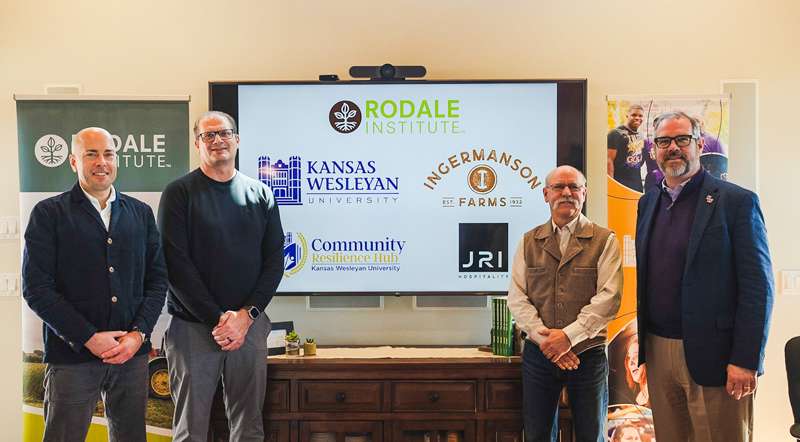
KWU
KUTZTOWN, Pa. – Rodale Institute, a global research and education nonprofit, is joining forces with Kansas Wesleyan University and Quail Creek Family Farms (QCFF) to grow education programming in Kansas focused on regenerative organic farming models.
Priorities for the organizations include developing an accredited Kansas-based Rodale Institute Farmer Training (RIFT) program, establishing a Rodale Institute Regional Resource Center in Salina and exploring potential sites for a local farm-to-institution production facility.
“Rodale Institute is committed to expanding opportunities for the next generation of American farmers and investing in the nation’s farming communities,” said Rodale Institute CEO Jeff Moyer. “Through this joint effort, Rodale Institute, Kansas Wesleyan University and Quail Creek Family Farms will build a pipeline of farmers skilled in regenerative organic agricultural practices and establish a hub for agriculture education and innovation in Kansas.”
“A partnership with a global leader that has a 75-year commitment to regenerative organic agriculture will enable our Community Resilience Hub to provide the highest level of research and programming available in the industry,” said Matt Thompson, president and CEO of Kansas Wesleyan. “We are honored to work alongside Rodale and thrilled to embark on a new and deeper relationship with JRI Hospitality. It is exciting to imagine what our three organizations can do to harness the health and safety of our land, food systems and community.”
“We’re so excited to have Rodale Institute as a partner along with Kansas Wesleyan. Both are leaders in what they do and how they treat the communities they serve,” said QCFF owner, Jason Ingermanson. “When taking over Ingermanson Farms from my dad in 2015, I recognized the direction farming was going and the added importance of how our future food is grown, distributed, and presented to the families that we feed. I’m excited to collaborate and work with other area family farms to introduce the idea of incorporating these practices and becoming a part of our distribution for the betterment of both the farmer and consumer of Kansas farm commodities.”
The Rodale Institute Regional Resource Center in Salina will be the institute’s sixth regional center in the United States. The institute’s local extensions serve farmers in select geographical areas by conducting practical research on local soil and crops, providing education programming and assisting farmers with regionally significant challenges.
ABOUT RODALE INSTITUTE: Rodale Institute is a 501(c)(3) nonprofit dedicated to growing the regenerative organic agriculture movement through rigorous research, farmer training, and education. The Institute’s groundbreaking science and direct farmer support programs serve as a catalyst for change in farming and food production worldwide. Over its 75-year history, Rodale Institute has proven that organic farming is not only viable but essential to humanity’s survival.
ABOUT THE COMMUNITY RESILIENCE HUB (CRH) AT KANSAS WESLEYAN UNIVERSITY: The Community Resilience Hub at Kansas Wesleyan University is a multifaceted initiative that supports hands-on training and research in regenerative organic farming, food security and community resilience through education, advocacy and action. The university is an integral partner in a three-year USDA Local Food Promotion Program grant with the Kansas Rural Center, Common Ground Producers and Growers, and St. John’s Missionary Baptist Church, focused on creating a 12-county food corridor of local, regenerative, chemical-free food offerings along Interstate135 between Salina and Wichita. Research and education will begin in the coming year on six-hundred acres at Quail Creek Family Farms in Saline County, Kan., managed by the Hub’s collaborative partner, JRI Hospitality. Through collaboration with Rodale Institute and Quail Creek Family Farms, CRH is devoted to training the next generation of regenerative organic farmers through field experience and research through an accredited curriculum. The vision of CRH is to develop partnerships and replicable programs that will lead to more stabilized, secure and equitable food systems in communities in the state and across the nation.





